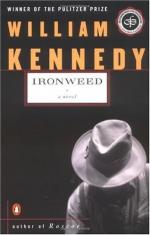|
This section contains 289 words (approx. 1 page at 400 words per page) |

|
Although Kennedy's fame is so recent that no extended analyses of the individual works yet exist, Ironweed will undoubtedly be discussed by future critics as a novel wherein its American setting figures strongly into the fiction. Like Faulkner's Mississippi and Steinbeck's California, Kennedy's fiction grows from the soil of an American region — the New York capital with its Irish Catholic politics of the 1930s, the contingent corruption of that era, and the American dreams and nightmares generated by what William Carlos Williams termed "the American grain."
Yet Ironweed is more accurately placed within a larger tradition: its use of place as the immediate point of departure for a mythic exploration of the human mind. In this context, Kennedy is the descendent of writers such as Joyce, Proust, Woolf, and Faulkner; he persistently explores the dimensions of human consciousness, uses a deftly controlled interior monologue to...
|
This section contains 289 words (approx. 1 page at 400 words per page) |

|




